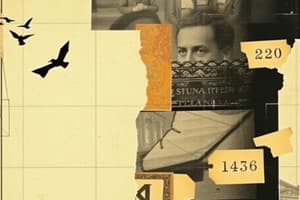Podcast
Questions and Answers
How did the agricultural revolution pave the way for the rise of civilizations?
How did the agricultural revolution pave the way for the rise of civilizations?
The agricultural revolution led to surplus food production, which supported larger populations and allowed for specialization. The rise of civilizations came from people doing different jobs and not needing to produce food.
In what ways did the Renaissance challenge the prevailing worldview of the Middle Ages?
In what ways did the Renaissance challenge the prevailing worldview of the Middle Ages?
By promoting a renewed interest in classical art, literature, and philosophy, the Renaissance challenged the religious and dogmatic focus that predominated the Middle Ages.
Explain how the Enlightenment influenced the French Revolution.
Explain how the Enlightenment influenced the French Revolution.
The Enlightenment promoted ideas such as reason, individualism, and human rights. This inspired the revolutionaries to seek liberty and equality.
What were the key differences between the Positivist and Marxist schools of historical thought?
What were the key differences between the Positivist and Marxist schools of historical thought?
In what ways did the Age of Exploration transform global interactions and power dynamics?
In what ways did the Age of Exploration transform global interactions and power dynamics?
How did the First and Second World Wars contribute to the rise of contemporary history?
How did the First and Second World Wars contribute to the rise of contemporary history?
What factors contributed to the start of the Industrial Revolution, and what were some of its long-term consequences?
What factors contributed to the start of the Industrial Revolution, and what were some of its long-term consequences?
How can studying history help us better understand current political debates and policy decisions?
How can studying history help us better understand current political debates and policy decisions?
Explain how Postcolonialism challenges traditional historical narratives.
Explain how Postcolonialism challenges traditional historical narratives.
What are the key events that typically mark the transition from the Early Modern Period to the Modern Period, and why are they significant?
What are the key events that typically mark the transition from the Early Modern Period to the Modern Period, and why are they significant?
Explain how examining both primary and secondary sources enhances a historian's understanding of a past event.
Explain how examining both primary and secondary sources enhances a historian's understanding of a past event.
How does understanding the context of an event influence its historical significance?
How does understanding the context of an event influence its historical significance?
Describe how a historian might use the concept of 'change and continuity' to analyze the effects of a major revolution.
Describe how a historian might use the concept of 'change and continuity' to analyze the effects of a major revolution.
Why is understanding 'perspective' important when analyzing historical accounts, and how can a historian integrate different perspectives into their work?
Why is understanding 'perspective' important when analyzing historical accounts, and how can a historian integrate different perspectives into their work?
Explain how the focus of social history differs from that of political history, and give an example of a question each might explore regarding the same historical period.
Explain how the focus of social history differs from that of political history, and give an example of a question each might explore regarding the same historical period.
Discuss how the study of economic history can provide insights into the causes and consequences of major social or political changes.
Discuss how the study of economic history can provide insights into the causes and consequences of major social or political changes.
In what ways can an artifact provide more reliable historical information than a written primary source, and what are some limitations of relying solely on artifacts?
In what ways can an artifact provide more reliable historical information than a written primary source, and what are some limitations of relying solely on artifacts?
Explain the significance of periodization in the study of history. How does dividing history into periods such as 'Ancient History' help historians, and what are some potential drawbacks of this approach?
Explain the significance of periodization in the study of history. How does dividing history into periods such as 'Ancient History' help historians, and what are some potential drawbacks of this approach?
Flashcards
What is History?
What is History?
The study of the past, including the discovery, collection, organization, and presentation of information about past events.
What are Primary Sources?
What are Primary Sources?
Original materials from the time period being studied (e.g., letters, diaries).
What are Secondary Sources?
What are Secondary Sources?
Interpretations and analyses of primary sources (e.g., books, articles).
What is Causation?
What is Causation?
Signup and view all the flashcards
Change and Continuity
Change and Continuity
Signup and view all the flashcards
What is Historical Context?
What is Historical Context?
Signup and view all the flashcards
What is Political History?
What is Political History?
Signup and view all the flashcards
Ancient History
Ancient History
Signup and view all the flashcards
Middle Ages
Middle Ages
Signup and view all the flashcards
Early Modern Period
Early Modern Period
Signup and view all the flashcards
Modern Period
Modern Period
Signup and view all the flashcards
Contemporary History
Contemporary History
Signup and view all the flashcards
Development of Agriculture
Development of Agriculture
Signup and view all the flashcards
Rise of Civilizations
Rise of Civilizations
Signup and view all the flashcards
Renaissance
Renaissance
Signup and view all the flashcards
Reformation
Reformation
Signup and view all the flashcards
Enlightenment
Enlightenment
Signup and view all the flashcards
Globalization
Globalization
Signup and view all the flashcards
Study Notes
History: An Overview
- History is the study of the past.
- It encompasses the discovery, collection, organization, and presentation of information about past events.
- History can also mean the period after writing was invented.
- The term "history" is derived from the Greek word "historia," meaning inquiry, knowledge acquired by investigation.
Methods of Historical Study
- Historians use various sources to study the past, including written documents, oral traditions, artifacts, and archaeological sites.
- Primary sources are original materials from the time period being studied, such as letters, diaries, official records, and eyewitness accounts.
- Secondary sources are interpretations and analyses of primary sources, such as books, articles, and documentaries.
- Historical analysis involves evaluating the reliability and validity of sources, considering different perspectives, and constructing narratives that explain past events.
- Historiography is the study of how history is written and interpreted, and how different historians approach the same topic.
Key Concepts in History
- Causation: Understanding the causes and effects of historical events.
- Change and Continuity: Identifying patterns of change and stability over time.
- Context: Understanding the social, cultural, and political environment in which events occurred.
- Significance: Determining the importance of historical events and their impact.
- Perspective: Recognizing that history is interpreted from different points of view.
Branches of History
- Political History: Focuses on the study of governments, political systems, leaders, and movements.
- Social History: Examines the lives, customs, and social structures of ordinary people.
- Economic History: Studies the production, distribution, and consumption of goods and services in the past.
- Cultural History: Explores the art, literature, music, ideas, and beliefs of past societies.
- Military History: Analyzes wars, battles, armies, and military technology.
- Diplomatic History: Investigates international relations and foreign policy.
- Intellectual History: Explores the history of ideas and ideologies.
- Environmental History: Studies the relationship between humans and the natural environment.
Periodization
- Historians divide the past into periods to help organize and understand historical events.
- Common periodizations include:
- Prehistory: The period before the invention of writing.
- Ancient History: From the beginning of writing to the fall of the Roman Empire (c. 3000 BCE – 500 CE).
- Middle Ages: From the fall of the Roman Empire to the Renaissance (c. 500 CE – 1500 CE).
- Early Modern Period: From the Renaissance to the French Revolution (c. 1500 CE – 1800 CE).
- Modern Period: From the French Revolution to the present (c. 1800 CE – Present).
- Contemporary History: From World War II to the present (c. 1945 CE – Present).
- These periodizations focus on Western history and other regions might have different periodizations.
Major Historical Events
- Development of Agriculture: The transition from hunter-gatherer societies to settled agricultural communities.
- Rise of Civilizations: The emergence of complex societies with cities, governments, and specialized labor.
- Ancient Empires: The formation and expansion of large empires, such as the Roman Empire, the Persian Empire, and the Han Dynasty.
- Renaissance: A period of renewed interest in classical art, literature, and philosophy.
- Reformation: A religious movement that challenged the authority of the Catholic Church.
- Age of Exploration: A period of European exploration and colonization of the Americas, Africa, and Asia.
- Scientific Revolution: A period of major advances in science and mathematics.
- Enlightenment: An intellectual and cultural movement that emphasized reason, individualism, and human rights.
- French Revolution: A revolution that overthrew the French monarchy and established a republic.
- Industrial Revolution: A period of major technological and economic change.
- World Wars: Two global conflicts that involved many of the world's major powers.
- Cold War: A period of political and military tension between the United States and the Soviet Union.
- Globalization: The increasing interconnectedness of economies, cultures, and societies around the world.
Schools of Historical Thought
- Positivism: Emphasizes the use of scientific methods to study history and seeks to identify objective laws of historical development.
- Marxist History: Focuses on the role of economic factors and class struggle in shaping history.
- Annales School: Emphasizes the study of long-term social and economic trends, as well as mentalities and collective identities.
- Poststructuralism: Challenges traditional historical narratives.
- Postcolonialism: Examines the impact of colonialism.
- Revisionism: Aims to correct or update historical narratives in light of new evidence or perspectives.
- Psychohistory: Applies psychological theories to interpret historical events and the lives of historical figures.
Why Study History?
- Understanding the present: History provides context for understanding current events and issues.
- Developing critical thinking skills: History teaches us how to analyze evidence, evaluate different perspectives, and construct arguments.
- Learning from the past: History offers lessons about human behavior, political systems, and social change.
- Appreciating diversity: History exposes us to different cultures, perspectives, and ways of life.
- Promoting civic engagement: History can inspire us to become informed and engaged citizens.
- Source of identity: History helps create personal, group and national identities.
Studying That Suits You
Use AI to generate personalized quizzes and flashcards to suit your learning preferences.




